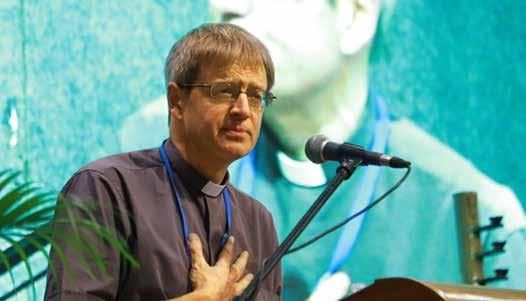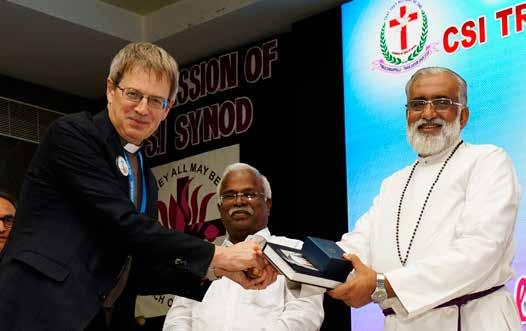
5 minute read
Towards a Koinonia of Love and Equality
Some commentators feel that the coin of koinonia has become a little too smooth, losing its distinctiveness. Its use in official documents has robbed the word of much of the power that it possesses in the Scriptures, especially in Paul’s letters and within the texture of John’s gospel and the Johannine writings, which speak so poetically and powerfully of what koinonia really means.
fficial church usage has rendered koinonia blandly as ‘communion’. Congregations may recognise ‘koinonia’ as ‘fellowship’ identifying it most closely from our frequent repetition of the Grace: ‘The grace of our Lord Jesus Christ, and the love of God’... and the fellowship (Koinonia) of the Holy Spirit, be with us all evermore’. Even here, fellowship can at times seem to lack weight or depth of meaning. We need an enlarged sense of koinonia: Communion, fellowship, but more expansively: it is participation, partnership, a mutual belonging, a sharing; it is a participational knowledge. It is the embrace and the recognition and intimacy of being together in the love of Christ.
None of these words is adequate in capturing the depth of mystery of our life together and the depth of koinonia which goes beyond these descriptions. Its spirit is understood more fully in the knowledge of our lives and encounters with each other; when a dear friend pays an unexpected visit or with the gentle squeeze of the hand at the bed of loved one who is dying. More powerfully, it is also the moment when barriers dissolve, when recognition dawns, when reconciliation beckons; when the stranger feels accepted for who they are.
If ‘the People of God‘ speak of a pilgrim church, a forward movement, the story of O
salvation coming to fulfilment and the ‘Body of Christ‘ of sacrament and radical unity in the face of difference and potential division, then the spirit of koinonia speaks of fellowship, a deeper participation in the Incarnation, of a deepening dimension to the life of the Church. It speaks of partnership, sharing and a mutual abiding.
The spirit of koinonia enlivens what it means to be the People of God, the Body of Christ; it is that which makes these things real. In the language of koinonia - it is the personal, the deeply human dimension of being in Christ that is to the fore - rather than the salvation story or a concern for unity and order within the Fellowship. It entails a deeply practical and pastoral theology concerned with the lived reality, with the grounding of the life of the church in how its members act towards each other and in their reaching out to the world. Koinonia involves an acceptance of the ‘other’ and the realisation of a barrier broken; it reconciles, and whether through words or action, there is a sacramental connectivity involved. Brought to birth by the Spirit of Christ it creates a distinctive type of space between persons, the sort of solidarity which takes us to full stretch as human persons and renders us vulnerable; it involves risk, discomfort and sacrifice.
Koinonia should bring a richness and a depth dimension to our understanding and
life of the church. It challenges us through our shared participation in Christ to a much more personal identification with others; it witnesses a radically different kind of human solidarity from that which we see in the world. It also deepens our commitment to mission, in prophetic action, in partnership and solidarity with others.
The scope of koinonia ranges widely. This is clear in Paul’s writing where it is applied to participation in Christ and his sufferings, to the relationship between Christ and the community, and Paul’s own relationship to various churches. It is also at the heart of a deeply personal appeal: In his carefully crafted pastoral letter to the slave-owning Philemon, arguing that the runaway slave Onesimus be received by his former owner, not just as blessed brother, but as Paul himself: ‘So if you consider me your partner (koinonon), receive him as you would receive me’. The spirit of koinonia most powerfully expressed at the heart of Paul’s letter to the Philippians, penned in prison, where Paul at his most profound and reaches the depths of his own understanding: ‘if there is any encouragement in Christ, any consolation from love, any sharing (koinonia) in the Spirit’ then if these things ‘bring me to the fullness of joy’ doing ‘nothing from selfishness or conceit’, but in humility ‘counting others better than yourselves’ - look to the ‘interest of others’ and ‘put on the mind of Christ’.
The depth of our identification with others may even need teasing out of the second part of the greatest commandment: Love your neighbour as yourself. For how often do we hear ‘love your neighbour as much as yourself’ rather than ‘as yourself?’ The real challenge is to see our neighbour as our self and indeed our self as a neighbour. This radical identification lies at the heart of the mystical understanding of koinonia. This is participation in Christ. What does this look like for our corporate life, for us as Church?
To renew the spirit of koinonia in the life of the church is to be concerned with lived Christianity. It is concerned as Jesus himself was - with open-ended encounter, deep listening and generous hospitality. The incarnation teaches us that God’s love stretches to the fullness and extremity of humanity. The Spirit of koinonia calls us to an identification of something that may be called ‘deep listening’ where the trials and sorrows of the individual person or community open a window upon the injustices associated with the broader context and circumstance. If though a deepening of the koinonia of the Spirit we are able to nurture a trust that allows honest self-criticism, to be open to correction and are willing both to receive and to offer wisdom then our life and mission together in Christ across national boundaries will be profoundly blessed.

Pictured top: Revd Duncan Dormor, USPG General Secretary, speaking at the 36th CSI Synod 2020 in the Trichy – Thanjavur Diocese, South India. Pictured bottom: Revd Duncan Dormor giving gift to outgoing Moderator of CSI, Bishop Oomen. Credit: USPG/Davidson Solanki








